Noxia Somnia
Face your fears in this chilling 2D survival horror action game about understanding and overcoming mental health struggles. Explore twisted nightmares, engage in challenging fast-paced combat and survive encounters with terrifying stalker enemies.
We spoke to Jeff Mundee, Director of Design and Development, and Chuck LeBlanc, Counselling Consultant, about the game in more depth.
The Core Themes
“The themes in the game are around anxieties and personal events from the creative director’s experience. It is a personal reflection presented in the context of overcoming relatable fears for people, especially young men. Young men as we were told by our subject matter experts are less likely to seek out counselling and other support,” Jeff explains, “so we wanted to meet those people at a favourite pastime. A game with enough depth and gameplay to be a good title on its own merits, but to also name and demonstrate these common challenges they might be facing. In Noxia Somnia, you start each stage being unable to defeat the boss that represents that fear. By coming to understanding [whilst playing] through that stage, you weaken the fear and can stop running and finally defeat it.”
“This transition from survival horror mode, managing stress, the comforts of light in the darkness, and navigating the maze what being hunted, to then a high-action battle was a very difficult arc of gameplay to balance. The catharsis of standing up to the fear you were running from is worth it every time.”
In the early stages of the game, we see conflicting messages from ‘Overwhelming Anxiety’ vs ‘The Guide’ with dialogue representing anxiety vs a more balanced and hopeful voice. What do you hope this representation of negative self-talk will portray to players?
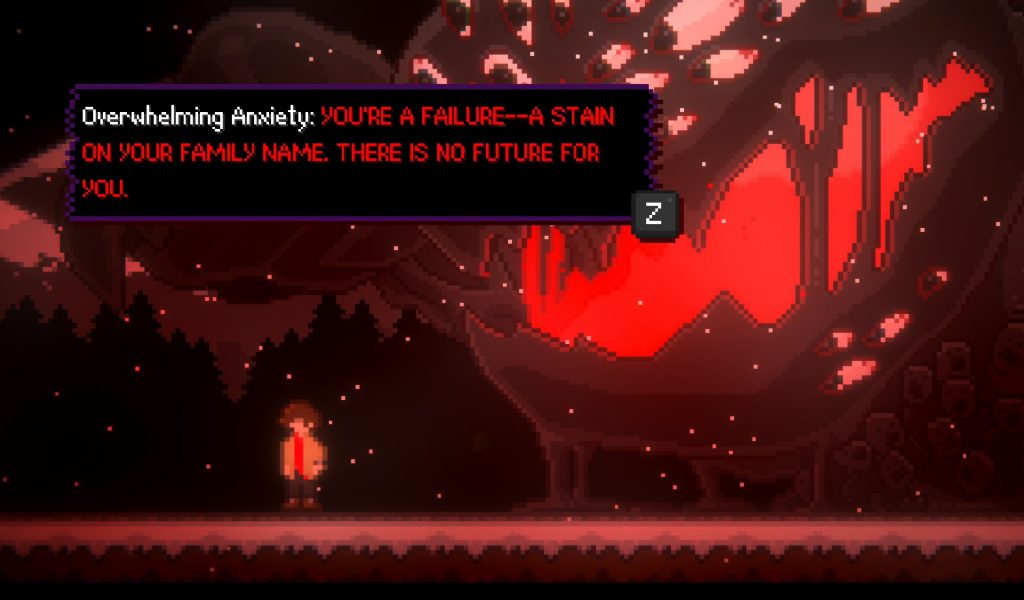
“This piece shows how negative thoughts, fueled by anxiety and self-doubt, can become a big part of how we see ourselves and the world,” Chuck describes. “Such negative “self-talk” can change how we see things and limit what we believe we can do. For example, Tristan in “Noxia Somnia” deals with this kind of self-talk, which makes us think of Wittgenstein’s idea: “The limits of my language are the limits of my world.” This means the stories we tell ourselves really shape our lives. Tristan’s struggle with deep anxiety is a constant stream of negative thoughts that control his life story.”
“Then, a guide comes along, full of hope and balance, offering a new way to see things based on the real events of Tristan’s life. This new and often different story challenges the old one, which is ruled by anxiety. The guide’s positive outlook helps us see what we might miss or ignore because it doesn’t fit with our negative thoughts. By introducing a different viewpoint, the guide shows how changing our internal story can change our negative views about ourselves.”
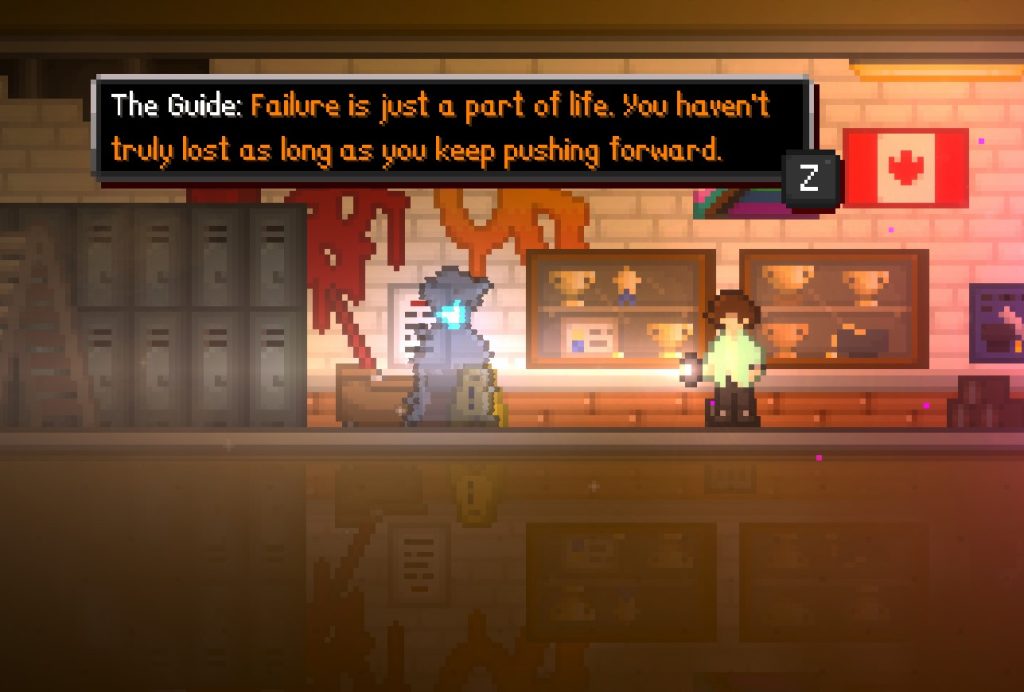
Why choose a horror theme for the game rather than other genres?
“Horror stories match perfectly with the complex issues of anxiety, loss, guilt, grief, and regret,” Chuck explains, “These emotions (which we often try to escape) can linger in our minds and sometimes take over our lives, making us feel isolated and overwhelmed. This is why horror genres frequently explore these themes. For example, “The Babadook” (2014) delves into grief, while “Shepherd” (2021) tackles guilt.”
“Anxiety, which comes from our brain’s limbic system and is tied to the amygdala’s survival responses (like fight, flight, freeze, and fawn), is a common tool in horror movies to raise the stakes and get your heart racing. The suspense and danger in horror stories tap into our primal fears, making us feel as if we’re the ones being chased. This feeling can mimic the feeling that anxiety can produce like impending doom which is helpful when attempting to help the audience feel what its like to have some forms of anxiety.”
What is something you want players who have less understanding of mental ill health to take away from Noxia Somnia?
“I hope that players who might not know much about mental health will connect with deep feelings they have. I want to show them they’re not alone and that many others feel the same way. By engaging with the themes in ‘Noxia Somnia’, I hope players will reach out to friends who are struggling like Tristan and understand the hidden battles people face.”
Skills utilised:
Games & apps, News
What We Take With Us
What We Take With Us is a guided meditation and set of activities comprised of 10 questions to aid anxiety and assist your workday.
The interactive webpage was created just after the height of the COVID-19 pandemic, as a means of supporting people through the darker days. We spoke to creator Adam Jerrett, Lecturer from the University of Portsmouth, on the creation of What We Take With Us.
“I’d had a really tough time, as a lot of people did, and I have always been quite scared of therapy, even as the process has previously been beneficial to me.” Adam explained, “I wanted to create something that would have helped me through those dark days – to almost reach out to myself from two years prior and let them know I’d made it to the other side, and I hoped that could help other people, too. Even though I made it during the pandemic, I wanted to make something universal, which is why the game’s questions are hopefully always applicable.”
The activities
The activities deliberately aren’t too demanding, but you do need a couple of things to get started with the activity:
- something to write with
- somewhere to write
- somewhere to sit
- something to record your voice
- a playlist of your favourite music
There are 10 tasks in total in the exercise, and they range from tidying up your workspace and some mindful reflection, to actively reaching out to others to listen and sharing stories in thoughtful ways.
You can complete these tasks online here.
More than an online space…
In January 2023, Adam wanted to look at how they could transform the What We Take With Us to a new level, and subsequently set up a physical space in Portsmouth called ‘Ana’s Office’. The space existed for 5 months following its initial launch in January.
Ana’s office was a physical location we set up here in Portsmouth to allow players to play What We Take With Us in a defined physical space. I specifically wanted to design it as a real calm and comforting space, but also as a space that belonged to someone. That someone was Ana Kirlitz, a character I created to tell additional stories through the lens of the game. Because WWTWU is quite a personal journey for players, I wanted to tell my own story of the pandemic through Ana’s character and her office.
“This then also manifested in an online alternate reality game where Ana had created a fan-made Discord server for the game, which I used as a hub to bring players into the game to hopefully build a community around it. On it, you’ll see the community we built, as well as snippets of Ana’s story. That story was extended in her physical office, which was this interesting hybrid between a “calm space” and an “escape room” type of framing.”
Group Learning & Support
We were curious as to how Adam would suggest co-opting the premise of What We Take With Us for group learning and support in larger settings.
“[The game] makes a great tool for group learning and support. One of the pillars of its design is “community”, so whilst WWTWU is played alone, it’s encouraged that players build communities so they can talk to others about their experiences,” Adam explained, highlighting the power of community within both solo and shared experience together.
“This can be done by setting up communities on things like Discord, like we did for Ana and her story, or through other things like forums, group chats, or even workshops.”
Adam also has previously held (and plans to hold more in the future!) a number of workshops to introduce people to the concept of What We Take With Us and provide a safe space for people to experience it. Get in touch with Adam here to learn more.
Skills utilised:
Games & apps, News
RE:CALL
RE:CALL is a narrative puzzle game that revolves around the central theme of changing the past to shape the present.
Its a very unique and emotionally resonant experience and one that we think many players might personally relate to. As the protagonist, Bruno, players will navigate through memories, solving puzzles, and altering events in order to learn things and achieve the desired outcome.
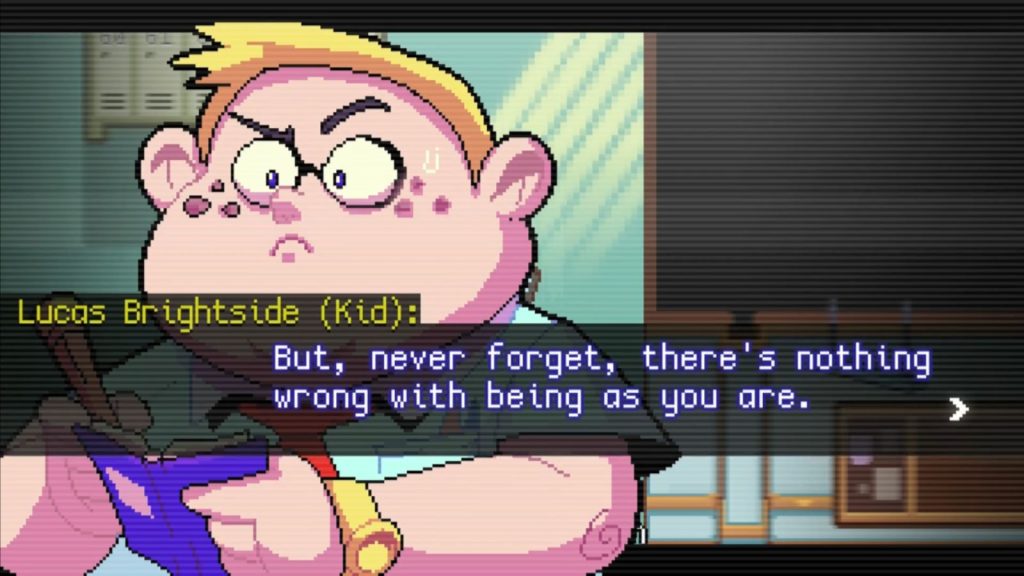
The gameplay is primarily story-driven, with a strong emphasis on character development. Bruno is portrayed with relatable depth, particularly in his struggles with body image issues. RE:CALL is quite subtle with how he views himself but as the game unfolds small remarks will show feelings that will be very recognisable to some. The game adeptly explores the impact of hurtful remarks and bullying on one’s self-perception. Ghostly apparitions in memories serve as poignant reminders that such experiences, even if not fully remembered, can leave lasting scars.
The narrative unfolds as Bruno confronts these issues and pieces together a larger, nefarious scheme. The game skilfully weaves together the threads of bullying, abuse, and self-discovery, showing that the characters’ unkindness often stems from their own internal struggles.
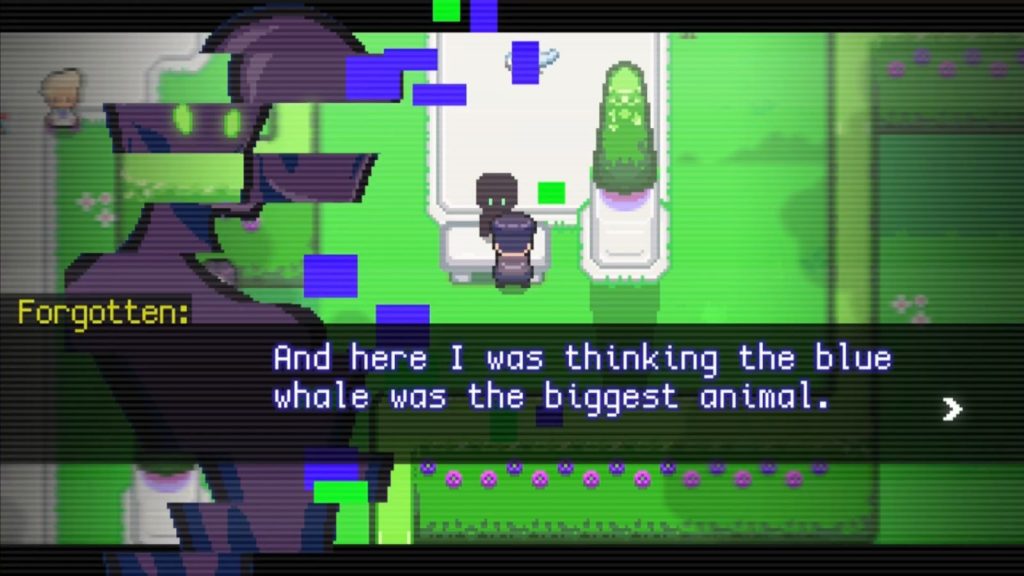
In terms of gameplay mechanics, RE:CALL excels in presenting challenging puzzles. The process of replaying memories and altering details incrementally adds depth to character interactions, providing insight into their motivations and complexities. You interact with the same characters in the same scenario but in slightly different ways each time. There are times at which the experience steps away from the memory mechanics and character development, but this small change in pace is not enough to dampen the overall experience.

The character development is commendable, but did leave us wishing for deeper exploration of certain characters. The subject of self-confidence and body image issues is realistically depicted, resonating with those who may find a personal connection to Bruno’s journey.
Overall, RE:CALL offers a compelling narrative, engaging puzzles, and a thought-provoking exploration of sensitive topics. Bruno’s relatability and the game’s ability to address complex issues make it an enjoyable and, at times, emotional experience.
Skills utilised:
Games & apps
Sibel’s Journey
Sibel’s Journey aims to educate on the subject of sexuality and gender in early adolescence in a unique self-learning space.
The game follows 13-year-old Sibel, who meets interesting people during an exciting weekend in Berlin. She gets to know their different ways of living and loving, then finally discovers the secret of her best friend Sarah.
‘Adopting an intersectional approach, Sibel’s Journey provides young people with sound knowledge and a positive attitude about topics such as anatomy, body image, communication, contraception, gender identity and healthy relationships.’
The creators of the game also offer a number of resources alongside the game, including workshops about gender, sexuality, bodies and personal boundaries. These include integration of the game into classes and workshops, facilitating a wider dialogue in the education sector.
The Berlin-based collective Food for Thought developed Sibel’s Journey alongside a number of partners, creating bespoke games about LGBTQ+, gender, identity and sexuality.
As women, trans people, queers, migrants and mothers of teenagers, we see diversity not as ornamental, but as a core part of our identities. Consequently, we incorporate not only our professional know-how in our specialist areas, but also our personal experiences and different perspectives into every experience we create.
At Safe In Our World, we’re thrilled to see more open conversations facilitated through play, allowing identity-based learning to be a more integral and engaging for young people.

Want to learn more? We chatted with Serenad from Food for Thought Media about Sibel’s Journey and the overall ethos around educating and raising awareness for important topics. Read the full interview here.
Skills utilised:
Games & apps
Obsessive Compulsive Game
Obsessive Compulsive Game is a short mobile experience created by Kelly M Tran, made with the intention of educating players on OCD.
We spoke to Kelly about the origins surrounding creating the game and the features within it which were carefully designed to create deeper understanding.
“[OCD] is an extremely misrepresented mental illness; most people don’t know what it is. People think it’s about cleaning or it’s this quirky thing, and it’s really difficult to describe to people,” Kelly explains, “media depictions do more harm than good in most cases”.
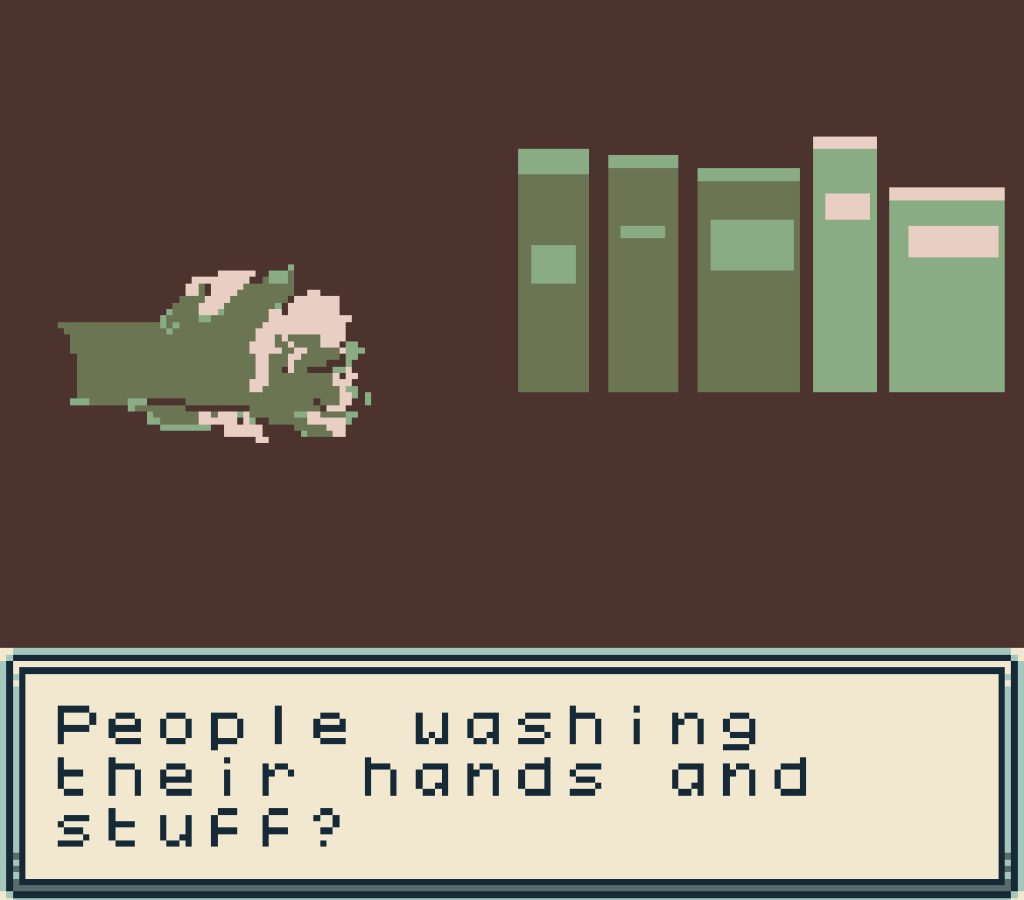
“I wanna express this and explain this to people, and was looking for that magic article to send to people that didn’t exist.” She explains, mentioning that it’s one of the difficult things about having OCD, is being able to meaningfully express what OCD can feel like. This ultimately led to her choosing to create a game that could provide a more intimate experience that anyone can pick up and play.

Creating a free and short experience like Obsessive Compulsive Game served as a way to explain OCD to people more easily, “this became the magic article that didn’t exist”, Kelly explains.
It wasn’t an easy task to create the game, however, as Kelly mentions it was “a wrenching experience to make” and re-traumatised her in many ways.
It’s so ultimately worth it in the end and I’m so glad I did it. It took a lot to make.
Kelly also talks about the translation of OCD traits into game mechanics; something that was one of the most powerful features of the game. “The moment I was like ‘this makes sense as a game’ was when you have to push the box about. You’re forcing players to do an OCD ritual. You have to count.”
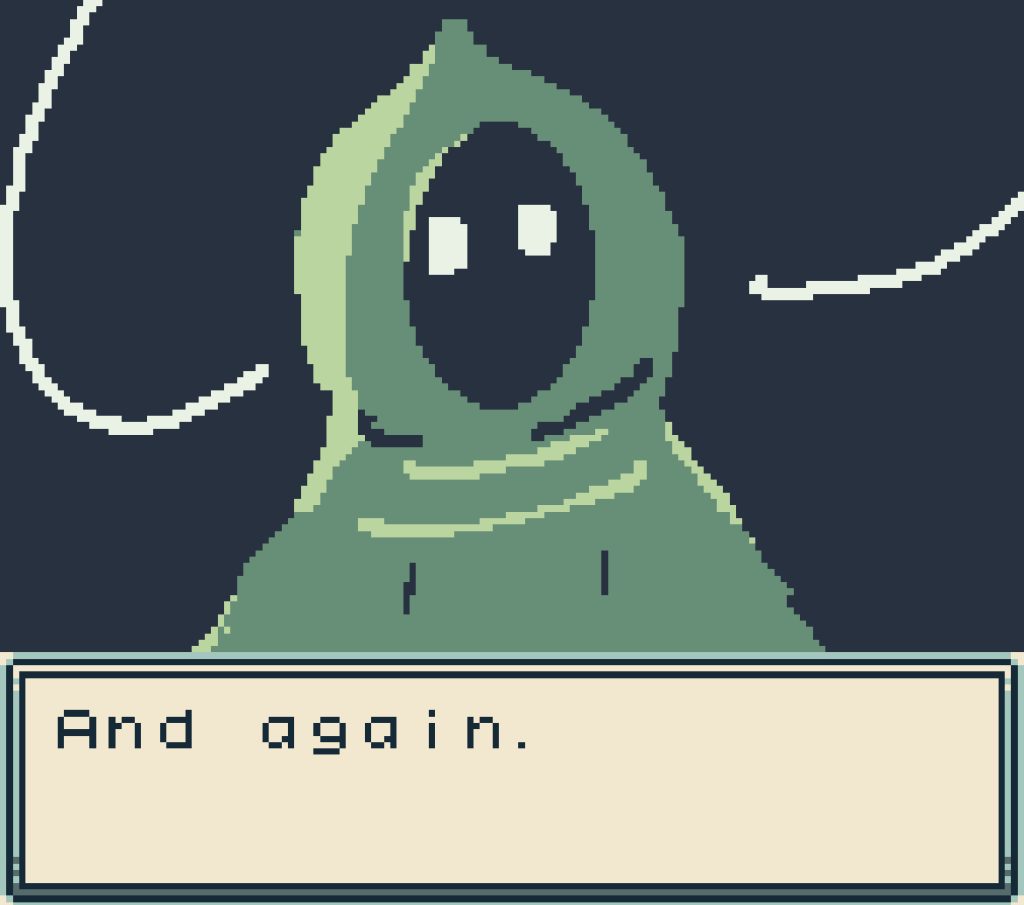
She’s also discussed ideas around making a larger scale game if she had the time – providing more light to de-mystifying OCD in game form.
You can experience the game here – This is a game about mental illness, and as such might be disturbing to some players. Situations in the game include imagined violence, anxiety, and suicidal ideation. Please play with care.
Skills utilised:
Games & apps
Timothy Tinyhat
Timothy Tinyhat is telling a tale about experiencing burnout through the perspective of a cartoon doodle.
Created by Sam Claydon, Timothy Tinyhat aims to highlight the importance of working in a healthy and sustainable way, rather than dwell on the hardships of burnout. This game gained the Editor’s Choice award for The Rookies website back in January 2022 and at this point in time the game is just in a vertical slice state.
I wanted to indirectly tell the story of a person going through a burnout by having the player play on the desk of a creative.
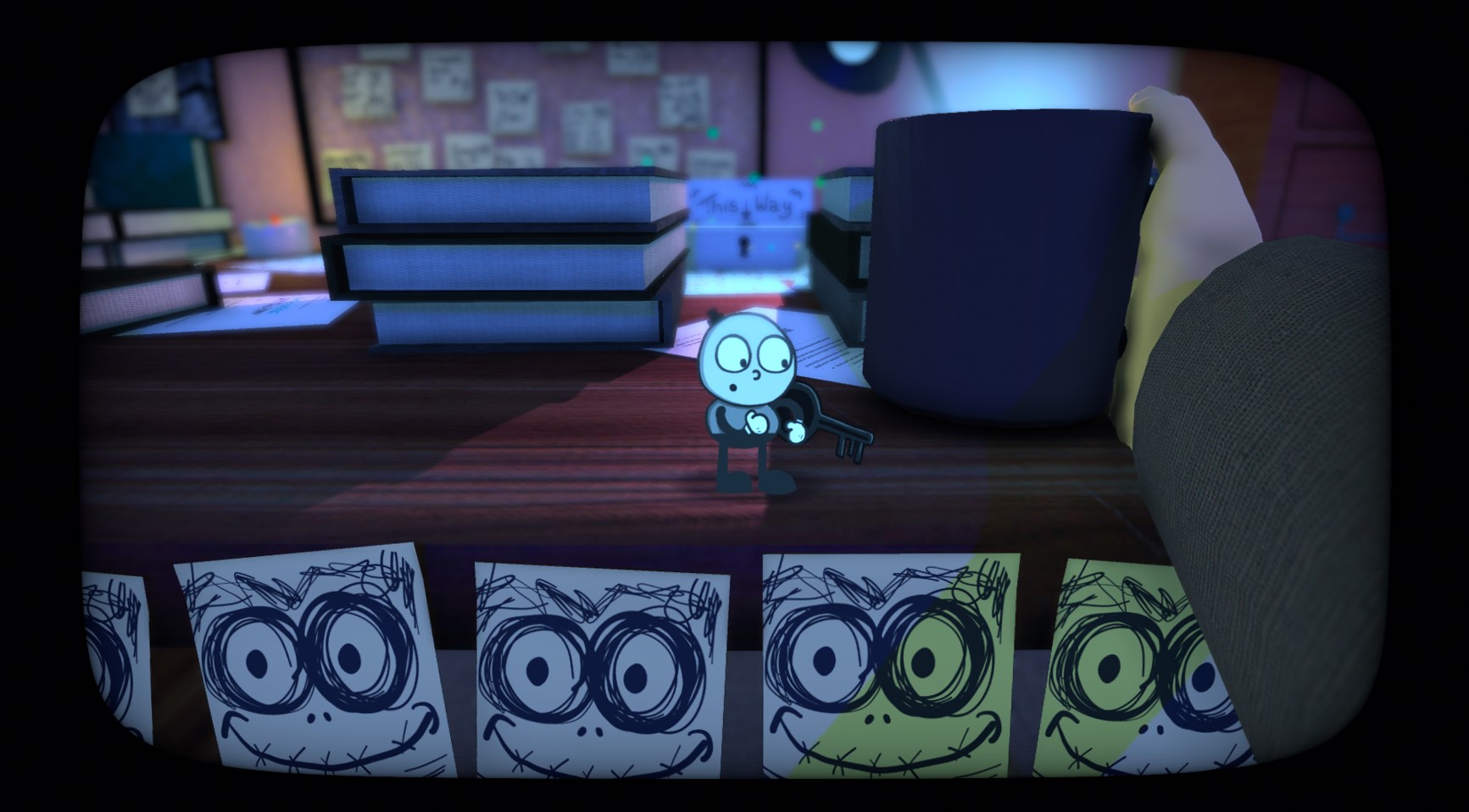
Sam started their Devlog back in November 2021, where they began documenting the process of making their game following the idea born out of lockdown 2020. Once the art style and direction was in full flow, Sam also made the decision to make the narrative around the game about burnout – to have an impact on the player.
We loved to read more about the creative process that indie devs undergo when creating a game, and hope that it encourages other aspiring game devs to read about decision-making in the development process and gain inspiration!
Key Features:
- 2.5D cartoon animation style
- story focused around burnout
- puzzle-adventure
Want to read more about burnout? Check out our personal story from Safe In Our World Patron Callum Underwood, who talks about the effects of burnout in our Stories collection.
Skills utilised:
Games & apps
Goodbye World
Goodbye World: Programmer Kanii and graphics artist Kumade are two friends who met in college.
After graduating, they’ve been creating indie games together, but so far life has been harsh; Their games don’t sell, and most of their time is spent working part time jobs to make ends meet… As Kanii desperately tries to find a way to make a product that sells, Kumade makes a decision―
This short experience looks at the challenges, successes and hardships of what creating an indie game can look like, following a personal story between Kanii and Kumade. The narrative explores why game developers want to create in the first place.
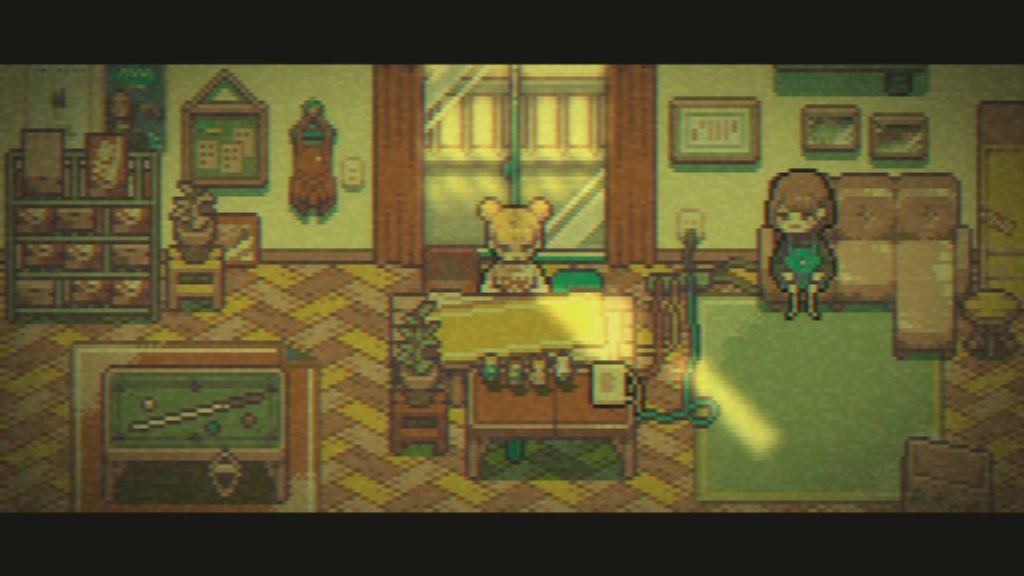
Through 13 chapters, and 12 stages of the in-game game ‘Blocks’, players will discover more about the characters and subsequent decisions which got them where they are today.
To celebrate it’s physical release from Numskull Games, we chatted with YO FUJII about the premise behind the game, as well as the takeaways they’d like other developers to walk away with post-credits. You can read the interview here.
Goodbye World Features:
- beautiful pixel style art
- captivating and deep story
- approx. 2 hour experience
- insight into indie game development
- retro game within a game
Skills utilised:
Games & apps
Psychotic Bathtub
Psychotic Bathtub is the story of an escalating mind… and ducks.
The game deals with a psychotic disorder in a small space. Players will take on the role of Ophelia in her bathtub and interact with the environment. Players will argue with a rubber duck, drink wine, and add more bathwater throughout the game. Each of your interactions threatens to escalate and each action has consequences.
You might accidentally drown your duck, the wine could into poison, and the bathroom is flooded and so you move through the disorder towards different endings. Psychotic Bathtub is a multilinear indie story game in development. Its most recent prototype offers four different endings and a playtime of up to thirty minutes.
Psychotic Bathtub is a game that offers multiple choices and tries to see what you will decide to do in this scenario that you find yourself in with Ophelia and her duck. With up to four different endings and each action having a consequence, which path will you choose?
Features:
- A beautifully hand-drawn art style
- Multiple choice
- A powerful story that delves into mental health disorders
If you want to try the game out for yourself, you can do so HERE. You can also check out more of our Mental Health Related Games and Apps HERE.
Skills utilised:
Games & apps
A Taste Of The Past
In A Taste Of The Past, players will step into the shoes of Mei, a shy, Chinese-American high school student that is dealing with the sudden passing of her mother.
After Mei loses her mother’s recipes, she embarks on a train and realises that her ancestors have also boarded as well. Through talking to her family she will learn and uncover her mother’s recipe for traditional noodles while also learning self-love, grief and healing.
“Experience a story of growth through reliving precious moments with family and cooking. A Taste of the Past is a relatable and touching journey about holding those you love close.”
This is a game that personally hit home in a very real way, the stages of grief, denial, anger, bargaining, depression, and acceptance. Developer Sondering Studio beautifully crafted an experience that shows you their way of dealing with grief.
Through the story, its design, the music, everything about this game provides a very heartfelt experience. Mei’s journey is one that will resonate with many and helps open your eyes to others’ experiences of grief. Through the game, you will experience cooking mini-games that brings you closer to your mother in a thoughtful way.
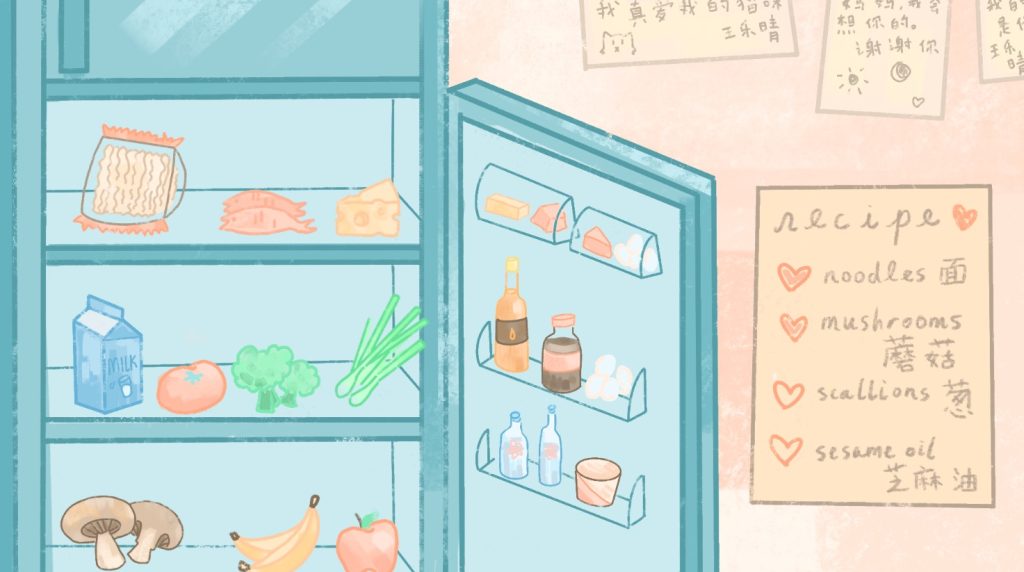
Features:
- Take on mini-games to learn the recipe
- Experience a heartfelt narrative about grief
- Stylized hand-drawn art
- Original voice acting, writing, art and music
You can experience A Taste Of The Past HERE.
You can also check out more of our Mental Health Games and Apps HERE
Skills utilised:
Games & apps
OTXO
Featureless, unnamed, and without memories of how you came here… but you remember why. She’s waiting for you somewhere in this Mansion and you cannot leave until you find her. Cut your way through various unique areas and meet new allies as you delve deeper into the mystery, face your inner demons, and annihilate them.
OTXO (pronounced oh-cho) is a violent top-down shooter with roguelite elements. Play as the protagonist entering an inexplicable mansion in search of his lost love. As you venture deeper into the Mansion, more of its secrets will be unveiled to you.
Underneath its bloody and brutal violence, OTXO acts as an allegory of depression and the struggle of fighting one’s depression. It aims to be an empowering story about overcoming your own demons and not giving up that fight. The featureless and unnamed protagonist is just that on purpose. They act as a blank canvas because there’s no one face for people who face these types of battles. Alongside these themes, there are also references to how depression can affect your loved ones and others around you.
OTXO is Lateralis’ second game, a contrast to Dogworld, which released in 2021.
For the concept of the storyline; I wanted to make a game that was specifically about my thoughts and experience with depression. Obviously it’s different for everyone, it’s a very subjective thing, but for me depression is very much a battle. I wanted to take that… anger [anger’s maybe not the right word], of having to deal with something like this and focusing into the experience, which is why the game is so outwardly violent.
We chatted with Nate Haddock, developer of OTXO, about his experience in creating the game. You can read the interview here.
Skills utilised:
Games & apps
ZenVR
We are adding ZenVR: a meditation learning system taught in Virtual Reality, to our list of mental health related games and apps.
The experience combines the structure and teachings of real-world classes in the practice of meditation with the immersion of VR. With progressive lessons taught by your own instructor, you can learn the basics of meditation and a variety of mental and physical techniques you can use to bring balance, focus, and calm from virtual reality to your reality. Revisit curriculum at your own pace for learning retention using practice mode’s build-your-own meditations.

ZenVR began as a Master’s Thesis project at The Georgia Institute of Technology. The experience has been empirically proven in the respective paper to successfully guide novice meditators through their journey and affect real-world change, increasing mindfulness and equipping them with tools they can use in their daily lives. Now they’ve transformed their prototype into VR’s meditation learning system for major VR platforms to share the benefits of meditation with the world.
“We all deal with managing stress levels, and we look forward to providing you with some potential new mental frameworks and breathing techniques for helping to deal with your stress. ZenVR is designed to be like training wheels for real life. Learning to calm the mind and then how to apply it as we guide you into a practice you can embody anytime, anywhere when outside of VR”
In dealing with stress, you may find particular benefit in the breathing techniques covered in the curriculum:
- 1-2 breathing, found in Lesson 1
- 5 Count Breath (Exhale Counting), found in Lesson 3
- 10 Round Counting, found in Lesson 5
- Mindfulness of Breath, found in Lesson 7
Skills utilised:
Games & apps
Promising Times
In Promising Times, players step into the role of Oliver.
You’ll experience four days in the life of Oliver, in which he struggles with different aspects of his current life and isn’t in the best shape. After various encounters during the game, Oliver starts to feel better, and his life starts looking a little more brighter and colourful which is also demonstrated in the game’s art and design. Interacting with characters in this Universe will impact the way the game transforms through these four days.

In Promising Times it encourages Oliver and the player, to be more open, to have these conversations, to talk essentially and that is also what Andy’s Man Club and Game Gnomes have demonstrated here.
“The goal was to create an uplifting and engaging experience for players that may identify with Oliver and his struggles. They should have an encouraged feeling after playing and finishing the game. The ethos of the game is the slogan of Andy’s Man Club: #ItsOkayToTalk”
Features:
- A game world that transforms with Oliver
- Lots of characters to talk to and learn about
- A unique art style that changes as you progress
- Encouragement to talk and be open
Experience Promising Times HERE.
If you’re looking for helplines or support, please visit our Find Help page.
Skills utilised:
Games & apps
How To Say Goodbye
How To Say Goodbye is a story about a character that has recently passed away and turned into a ghost. As a newly made ghost, players are lost in an unknown world populated by other spirits. How To Say Goodbye tackles grief but in a beautifully crafted way, with kindness and understanding. In the little warning message, the game explains the game’s intentions of being a story that hopes to relate with some but might hit home for others.
Players will navigate through different levels with different themes throughout the game to help them find their friends who are prisoners of a mysterious wizard and accompany them on their journey to the other side. Players must go through different puzzles to get through the doors at the end of each level while the evil dark forces called spleens to try to cement your existence in a space between life and death.
We feel this belongs on our list due to the way it handles life and death in a narrative sense it explains things beautifully and pushes you to go forward throughout your playthrough. The puzzles are soothing and the atmosphere of the game is relaxing from the slow pace and the way the developers have crafted the experience.
Key Features
- Relaxing puzzles
- A heartfelt story
- Beautifully handcrafted design that keeps you wanting more
You can find How To Say Goodbye HERE.
If you’d like to see more of our Mental Health Games and Apps you can do so HERE.
Skills utilised:
Games & apps
Welcome To Elk
Content warning: ‘Welcome To Elk’ presents a number of personal journeys that may be triggering to some players. Triple Topping handles each story with care and love and is done to educate players whilst doing justice to people’s experiences.
The game contains scenes including deaths and children experiencing murder. Alcohol abuse, sexual assault, prostitution, violence and offensive language.
Welcome to Elk is a biographical adventure set on an island like no other, where every character you encounter has a story to tell. From the weird and wonderful to the dark and desperate, all the tales on Elk are based on true stories of life on the less travelled road. You play as Frigg, a young carpenter trading their busy life in the city for an apprenticeship in a small town. When she arrives in Elk, Frigg worries that the slower pace of life will be boring (they don’t even have the internet), but quickly discovers nothing could be further from the truth!
Welcome To Elk is a story that personally stuck with me (Jake) for all the right reasons, from the moment it starts to the moment it ends.

The characters are easy to get attached to, and you feel yourself rooting for them whilst playing. The protagonist in this story is Frigg, who arrives on the island where the first port of call is to head to the bar to meet the residents. Frigg will talk to all of the characters, and you’ll pick up information about each resident, as well as the island’s villain, Leeroy.
After fun and games with the village, the players returns home (a little intoxicated) before falling asleep. Frigg wakes up for their first day being a carpenter, but quickly learns that other tasks will always take precedence over the job at hand.
Over the next few days, players learn that the stories in every act, while are often very hard-hitting, are beautifully told and demonstrated by the developers. The stories are presented as little mini-games and sequences. After each act is complete, a small documentary begins with the real person telling their story. It’s very heartfelt, but heartbreaking when realising these are people’s realities.
Welcome To Elk has this way of drawing you in from the start, and it is an adventure that we recommend, but want to remind players to be aware of how hard-hitting the stories can be. It demonstrates the extremes that grief, mental health, and more can go – but they’re told in such a beautifully empathic and sympathetic way. Well done to Triple Topping for managing to approach these subjects with such care.
Features:
- Beautifully hand-drawn graphics that make you want to see more of the island
- Heartfelt but heartbreaking stories told in an empathic way
- Characters each with different personalities and traits
- Interactive island with items to search for with little backstories
Skills utilised:
Games & apps
Aka
Aka is a game that looks at loss on a large scale, following a war. Playing as a red panda who has vowed to no longer use their katana for war and instead only use it as a scythe, you move to a small island to attempt to find a peaceful life.
Many of the implications of grief are quite subtle in Aka: you are existing in a world that experienced profound loss and as you explore you begin to realise this fact. You move into an abandoned home on the island (its previous owner never returned from the war); you help an orphaned kitten; and seemingly every NPC you meet has a story about what they’ve lost. You will also find ghosts along your adventure – the souls of those impacted by the war – who you can help to move on.
Aka approaches the subject of grief in a hopeful way as you seek to repair the damage of the past, and focuses on relaxation and mindfulness through mechanics such as being able to just take a seat by a pond and watch the fish for a while. You can fully take your time with each aspect of the game, with no pressure to complete goals, no stamina or hunger: you need only to exist and live in the world it presents to you.
You can follow the creator of Aka here.
Features:
- Relaxing farming sim gameplay
- Quests to help other island inhabitants
- Thoughtful and affecting dialogue
- Painted art style
Skills utilised:
Games & apps
Brothers: A Tale of Two Sons
Brothers: A Tale of Two Sons is an emotional third person puzzle adventure of two brothers on a journey to help their father, who has fallen ill.
Players will guide the two brothers on an epic fairy tale filled with discovery, loss, adventure, and mystery. With no option for failure the brothers must rely on each other using their individual skills to protect one another and overcome the obstacles ahead in this unforgettable journey.
Whilst the original game made its debut in 2013, the Remake (which released in 2024) acts as a faithful upgrade to the original story. The remake introduces new character models, landscapes and updates to the performance and gameplay, as well as having re-recorded the soundtrack with a live orchestra.
The game is presented from a third-person view overlooking the two brothers. Players can choose to brave the adventure solo, or play on local co-op. Whilst playing solo, the brothers are moved independently by two thumbsticks on the controller. The controller triggers also cause the respective brother to interact with the game world, such as talking to a non-player character or grabbing onto a ledge or object.
Players choosing to play together, on local couch co-op, will each control a brother independently.
Death and grief are omnipresent themes throughout the brothers’ journey, as are themes of struggle, suicide and wellbeing.
Key Features:
- Control both brothers on this journey independently
- Solve puzzles and explore the world together
- Follow an emotional and immersive journey in a fairy tale world
Skills utilised:
Games & apps
Deficit
Deficit is a Semi-Fictional Experiential ADHD Story, based on real-life ADHD experiences. Players will navigate their way through several vignettes as they learn more about how structural barriers and attitudes can create a difficult environment for those whose brains work differently.
This game has a unique way of telling a story and being relatable to people with ADHD. This story might also help people explore their own mental health and help people ask questions they may have been having about ADHD. Deficit really carefully guides you through the life of a person with ADHD and the design choices involved make it a very surreal experience, while it is only a 15 minute experience, it’s one that has opened our eyes to what the condition can be like. Deficit is a great narrative that really helps educate.
Features
- A narrative written by a person that has ADHD
- The design is wonderful and really helps you engage
- Could be a fantastic educational tool
You can play Deficit for free here: https://astralditz.itch.io/deficit by Gav Sarafian
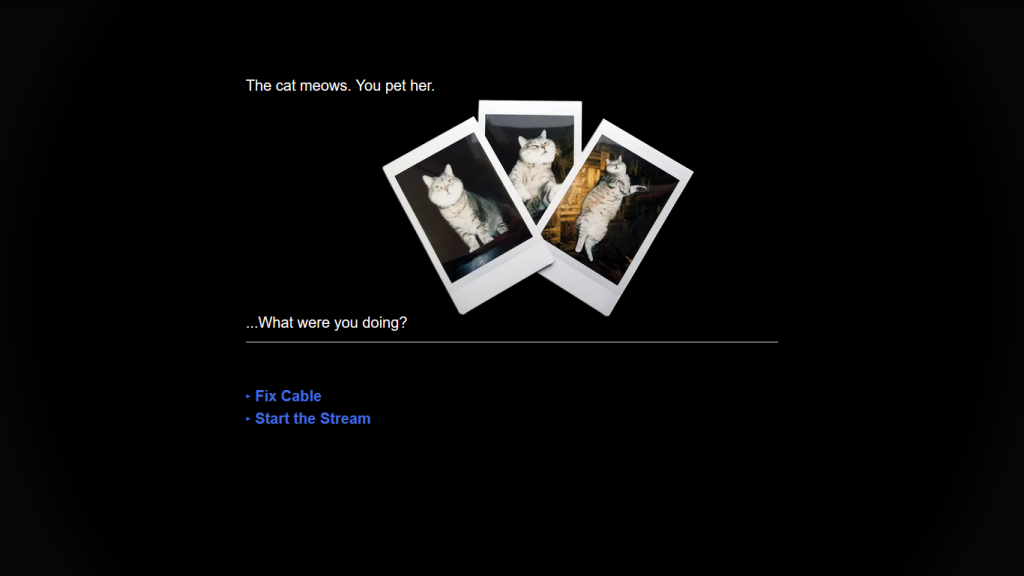
Skills utilised:
Games & apps
The Safe Place
We’re highlighting The Safe Place, an app designed by Jasmin Pierre.
The Safe Place is a Minority Mental Health App geared towards the Black Community. African Americans are 20% more likely to experience serious mental health problems than the rest of the general population. However, many Black people still do not wish to seek professional help for their mental illnesses.
Through this app, Jasmin offers talks to companies to help educate them on an array of issues that Black people can face throughout their lives and better ways to help. Jasmin also covers universities on talking about wellness programs and trying to diversify within the communities. Health professional talks about helping people learn more health about a lot of issues to help educate them. These issues include:
- racial trauma in corporate settings
- social justice
- burnout
- incarceration and mental health disparities
- youth mental health
- meditation
The app goes into the history of issues that the BIPOC communities have gone through and what effects it has had on them in all sorts of ways, including some of those mentioned above.
Within the app there are podcast episodes, a comic book and a Chat Wall in which people can be themselves in a safe place and chat with others.
The Safe Place contains a list of SAFE Support groups from Victims Of Police Brutality, Racism in the Workplace, Colorism and Featurism, Black Moms and Post Patrum Depression, Black LGBTQ+ support groups, Hair Discrimination, Surviving Family Abuse, Healthcare Discrimination, Support After A “Karen” Interaction and Substance Abuse Support. Also included are poll results on racial trauma to help see the statistics and it also has Inspirational Black Quotes for those who may need them.
Other sections consist of ‘Racism During the Pandemic’ which goes into many issues the communities have faced through that, but also it allows people to send emails in and try to help grow this section, it also takes stories that people have of their experiences. The app also contains a mental illness list of descriptions with Clinical Depression, Post Partum depression, PTSD, Anxiety, Bipolar Disorder, Suicide and Prevention and ADHD. The app features a massive array of uplifting information and signposts appropriately.
Key Features of The Safe Place
- An empathic app with support and resources
- A simple design that is easy on the eyes and easy to navigate
- A lot of empowering and useful information
- Courses on helping educate universities, workplaces, youth and more
Skills utilised:
Games & apps
Mendü
Meet Mendü: a free companion to talk though problems with, right now.
Learn how to de-stress, problem-solve, sleep better, relieve anxiety, gain more confidence and feel more balanced.
Mendü has been developed to equip women of colour with the tools to overcome self-doubt, feel supported and promote wellbeing. The founders of the app are also a neuroscientist and a therapist, who wanted to create tools that are focused on considering diverse female representation in mental health.
The app has a wealth of audio resources educating users on topics such as reducing stress, guiding your emotions, allyship and microaggressions, sleep, meditation, trauma processing and more.
Our journaling prompts were made by diverse women for others facing similar life events. We are transforming the way therapeutic journaling and meditation is done by providing relevant and inclusive audio pieces you can connect with.
It also has a range of journaling prompts to inspire and support you in your journaling experience.
Focuses
- sustaining the activist – taking care of yourself while changing the world
- lifting self image – improving your relationship with your hair, body, race & culture
- managing mood – manage days of feeling sad & anxious
- sparking everyday joy – small steps to make every day filled with more focus, joy & gratitude
- healing wounds and frustrations – heal the wounds holding you back and bring out your resilience
- finding restful sleep – let go of the day so you can have a good night’s sleep
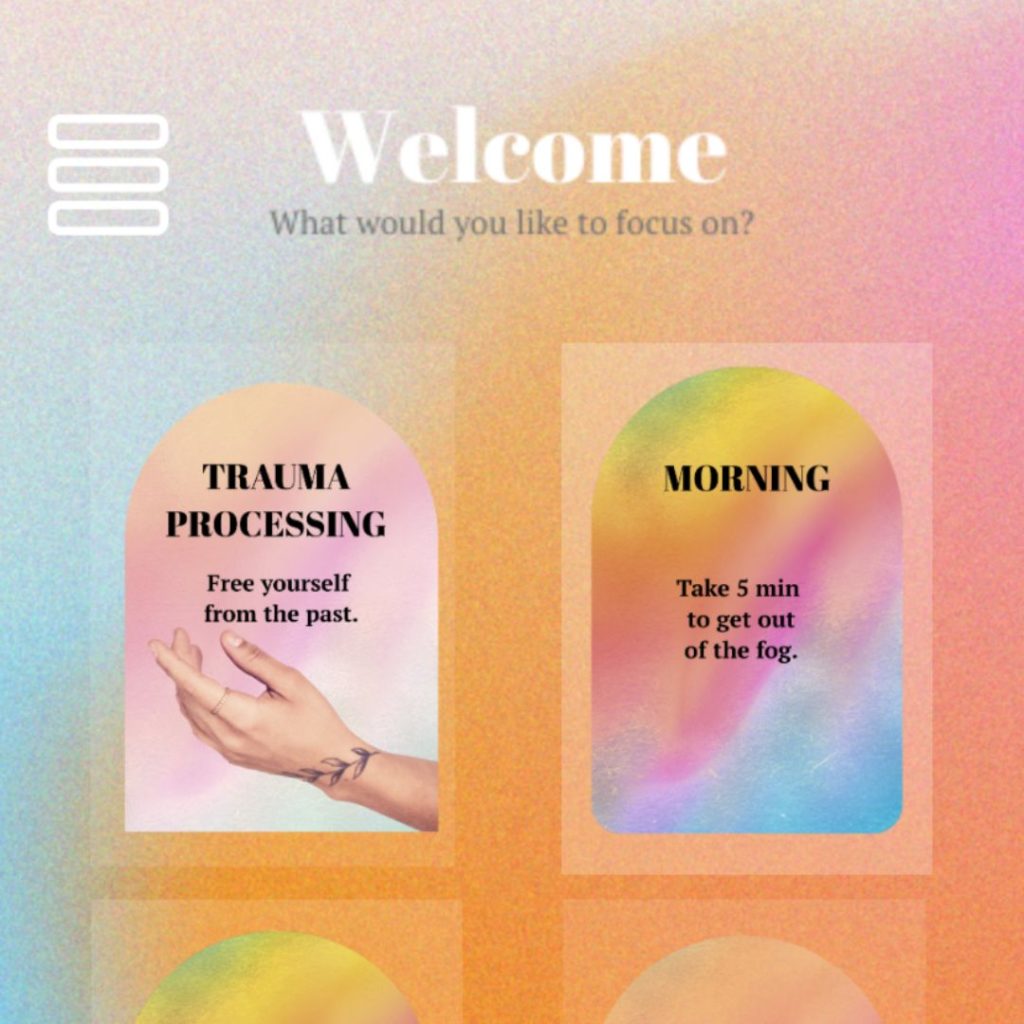
Skills utilised:
Games & apps
Headspace
Headspace is an app focused on improving the world’s happiness and health.
It’s backed by science, and has already been proven to reduce stress by 14% in 10 days! Shine is also a part of mental wellness app Headspace. Originally it’s own app, now combined with Headspace, it features daily meditations, self care courses and personalised support. The team at Shine joined Headspace Health to advance the company’s inclusive mental health strategy and content.
When we started Shine 6 years ago, we were frustrated by the lack of representation and inclusion in the mental health category. Naomi and I didn’t often see our identities as women of color, our socioeconomic backgrounds or even our body types represented in mainstream wellness.
And there were so many others with that same experience. We quickly discovered: people who identified as Black, Native American, Hispanic, Asian and/or LGBTQIA+—we all had higher rates of anxiety and depression, and fewer options for inclusive care. – Founders at Shine
The app tackles current stressors such as climate anxiety, practical support on things such as getting outside, and how to be patient with your progress.
Navigating Injustice
There is also a section on the app where diverse voices help users recognise their unique journeys, struggles and differences. One example of this is Indigenous mindfulness sessions, with accompanying meditations.
Key Features of Headspace
- mindfulness activities such as ‘how to practice self-love’, ‘mindful ways to use personal pronouns and inclusive language’ and more
- coping mechanisms on how to manage stress and anxiety
- support on how to sleep better, wake up easier and fall back asleep if you have disturbed sleep
- meditation techniques, benefits and guided sessions
Skills utilised:
Games & apps
The Longest Walk
The Longest Walk is a BAFTA nominated biographical walking simulator game about Sandy’s dad’s experience of living with depression and suicidal ideation.
The following game discusses themes of depression and suicidal intent which some players may find distressing.
The aim for this game is to help reduce feelings of isolation and encourage those who are struggling with depression or experiencing suicidal thoughts to reach out for help.
The game centres around the Tay Road Bridge – a crisis area between Dundee City and Fife for those seeking to take their own life – and tasks the player with virtually walking in Sandy’s dad’s footsteps as he recalls his journey through some of the toughest moments in his life.
We also spoke to Sandy in an interview about the process of creating the game.
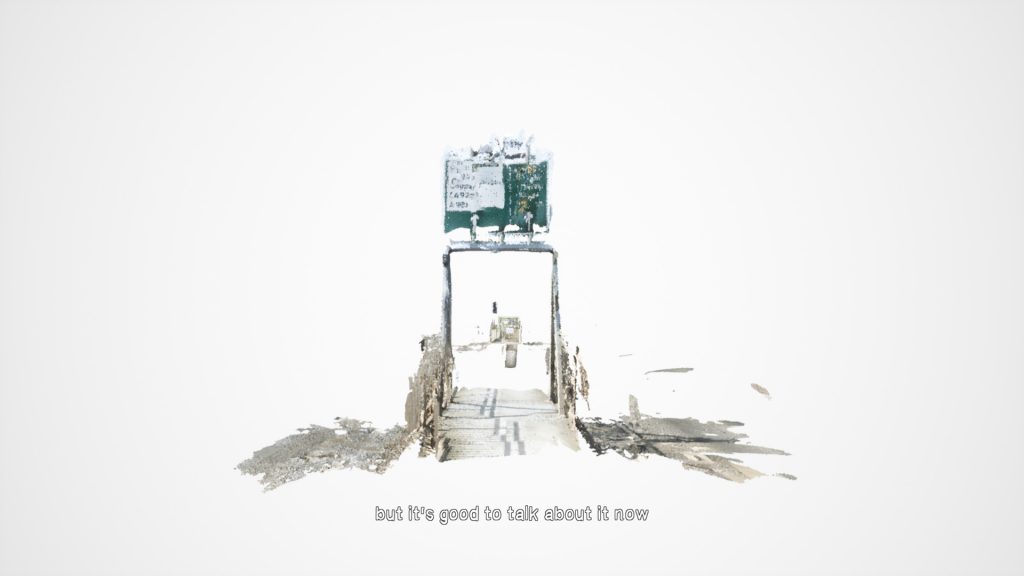
Over the past five years Dundee City has been one of the council areas with the highest suicide rate in the whole of Scotland. The game takes place on a walk over the Tay Road Bridge, which is an infamous local landmark for those seeking to take their life.
Whilst my father’s experience and the locations depicted in the game are specific to him, the thoughts, feelings, and message conveyed through his recollection of lived experience are universal.
This free documentary game is part of a series of biographical game prototypes that Sandy is developing for his PhD at Abertay University – Funded by The Northwood Charitable Trust – and was inspired by games such Actual Sunlight and That Dragon, Cancer. This game is published under the Abertay Game Lab practice-based research group.
Skills utilised:
Games & apps
Kinder World
We’ve added Kinder World to our list of mental health related games! Kinder World is a mobile game combining caring for plants and caring for yourself, in a comfy and relaxing environment of your own creation.
It’s the perfect app for casual checking in with yourself, and gently encouraging wellbeing exercises that are minimal effort. By integrating activities like emotion tracking and gratitude exercises, players are prompted towards self-care. Every plant is also procedurally generated, so the player’s plant growth is unique to them!
We’re making Kinder World because it can be very hard to work on being compassionate with ourselves, especially amidst a global pandemic. If you’ve struggled to make a habit with meditation or mindfulness apps, we’re making this game for exactly you! – Lauren Clinnick, CEO of Lumi Interactive.
We also love the addition of kind messages and affirmations from other players, fostering a kind gaming environment. This interactivity allows the game to feel more community-focused, and feel as though players are a part of something larger.
There is even a Discord for the community, which you can join here.
Secret Samy Gift Exchange
The holiday season is coming to Kinder World, which means it’s time to rest, relax, and (most importantly) practice kindness to ourselves and others. Our favourite Samoyed has been hard at work creating the first ever Secret Samy Gift Exchange — an opportunity for every Kinder World player to spread the love, send a kind message, and choose between two free in-game gifts for a friend or stranger, from artists Lucy Zhang and Lucy Mutimer! You can get started here.
Kinder World Features:
- Relaxing soundtrack
- You can name your plants
- You unlock a variety of mindfulness activities to complete, which you can choose from twice daily
- If you are unsure how to fill out an activity (e.g. the daily gratitude) you can see what other people have said to help you get ideas
- Your plant can be visited by insects and wildlife which leave affirmations for you
https://www.youtube.com/watch?v=4gw8BCfpm1Y&feature=emb_title&ab_channel=LumiInteractive
Skills utilised:
Games & apps
Wayward Strand
Wayward Strand is a heartfelt story told in a curious way. Hop aboard an airborne hospital and meet its fully-voiced cast of eclectic characters. As time passes for everyone on board, explore the interwoven lives of the patients and staff; discover something new on every playthrough.
Wayward Strand is a game that we thought belonged on the list for a multitude of reasons. November’s content theme is chronic illness at Safe In Our World and in Wayward Strand, the player explores the airship and gets to know many of the residents and also learns about them.
Being in an airship that is essentially a care home up in the air, you’ll learn of the conditions and characteristics these people face which we felt was very educational and quite emotional. The first feeling you get is, ‘this is such a cozy feeling airship’. With the view below of the ocean and mountain views in the distance, you can see why this is the perfect place for the residents.
There were strong feelings of comfort in one respect at the place they lived and with the staff that supported them, but also a feeling of sadness. It reminded me (Jake) of people I hold dearly that were in similar situations. Wayward Strand is very unique in its way of telling the story as the developers describe and it’s one I feel belongs on this list.
Features –
- Fully voiced cast with such fantastic personalities
- Hand drawn graphic feel that makes it more personal
- Lots of options and choices
- An emotional journey
Skills utilised:
Games & apps
You Don’t Look Sick
You Don’t Look Sick challenges players to complete resource management-based narrative objectives through a month in the life of your chosen and fully customisable character.
The end goal is to successfully pay all of their bills and rent by the end of the month. You Don’t Look Sick makes players have to think about balancing their energy, health and wellness by cleaning their apartments, eating, showering, sleeping, managing their social life, and keeping their job. All while dealing with the symptoms and complications that come with an invisible illness and hidden disability.
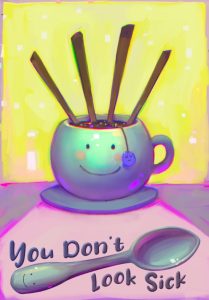
An inspiration for Menard’s work came from The Spoon Theory, by Christine Miserandino, which used spoons as a metaphor for the energy a person living with chronic illness or disability can expend in a day. The team has carefully developed a game revolving around these occurrences. You Don’t Look Sick does a fantastic job at opening people’s eyes to what life can be like for those living with illness or disability. The belief and hope is that others can also talk about there conditions more openly and help educate.
Features –
- Fully hand-designed narrative game full of different choices
- Wonderfully crafted art
- Fully customisable character
- Interesting management objectives
You can download and play the title yourself here.
Skills utilised:
Games & apps
